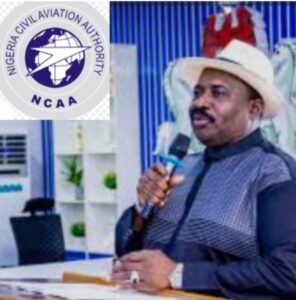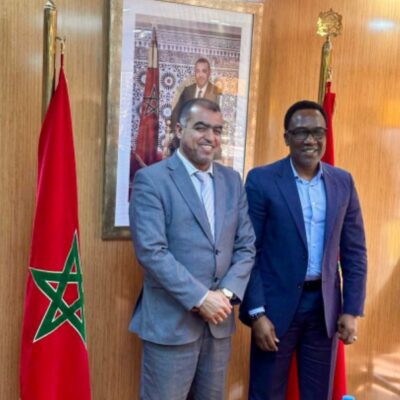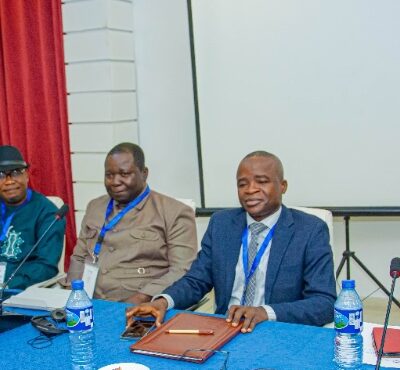
BY OLAPEJU OLUBI
The Nigeria Civil Aviation Authority (NCAA) has launched a nationwide skills development initiative aimed at equipping young Nigerians with practical competencies across various fields of the aviation industry, preparing them for future employment opportunities in this dynamic sector.
Recognising the twin challenges of youth unemployment and the acute shortage of skilled manpower in Nigeria’s aviation space, the NCAA designed this programme to bridge that gap, by providing targeted technical training that will enable young Nigerians to take advantage of emerging job opportunities across the country’s aviation landscape.
As part of this effort, the NCAA has commenced training for over 100 young people drawn from airport host communities in five key zones, Lagos, Port Harcourt, Kano, Abuja, and Kaduna.
The initial training modules cover Passenger and Baggage Handling as well as Airport Protocol and Logistics, providing participants with foundational skills that will serve them well not only within aviation but also in related sectors.
Speaking at the programme’s launch in Port Harcourt on Monday, NCAA Director General, Captain Chris Najomo, told young participants that “there are a lot of opportunities that exist in the aviation industry, but the youths will have to position themselves well to benefit from them, and that is through skills acquisition.”
Represented by Engineer Godwin Balang, Director of Aerodrome and Airspace Standards (DAAS), Captain Najomo explained that the Aviation Upskilling Development Programme (AUDP) aligns with the Federal Executive Council’s February 2025 approval of a national youth empowerment framework across all Ministries, Departments, and Agencies (MDAs).
In line with this directive, the Federal Ministry of Aviation and Aerospace Development has instructed all aviation parastatals to integrate their youth initiatives within this national structure.
The NCAA has categorised its target participants into three groups: Graduates of tertiary institutions for universities, polytechnics, colleges of education; Post-secondary, non-tertiary educated youth for those with some secondary education but no completed secondary or tertiary qualifications; Out-of-school and at-risk youth for those who did not attain primary or secondary education.
“Today’s remarks focus on the first category, graduates like you, equipped with academic credentials but often unsure of how to transition into meaningful work or skill-building opportunities. The Aviation Upskilling Development Programme is one response to this gap,” Captain Najomo stated.
Expanding on the career potential in aviation, Najomo described the sector as “one of the most dynamic and multidisciplinary industries in the world.”
He stressed that aviation goes far beyond pilots and flight attendants, embracing a wide range of roles, from regulatory oversight to logistics, engineering, ICT, finance, law, environmental management, and beyond.
Among the many promising areas he outlined were: Air Traffic Services, involving airspace planning, flight coordination, and communication; Aeronautical Engineering and Aircraft Maintenance covering aircraft design, maintenance, inspections, repairs, and cutting-edge aerospace technologies; Flight Operations and Cabin Crew Training to develop professionals in airline service, customer experience, and flight safety; Aviation Security and Safety, focused on compliance monitoring, risk management, and emergency preparedness; Regulatory Affairs — covering licensing, certification, and regulatory compliance; Drone Technology — a growing field that requires pilots, software engineers, and data analysts for surveillance, logistics, and emergency response; Sustainable Aviation & Environmental Management — addressing aviation’s environmental impact and sustainability goals; Airport Operations and Planning; Meteorology & Environmental Science and ICT, AI, and Data Analytics — using data-driven insights to optimise air traffic management, customer experience, and operational efficiency.
“Every one of these areas needs people. Skilled people. Committed people. People like you,” Najomo told the participants.
He emphasised that the broader objective of the Aviation Upskilling Development Programme is not simply to train for immediate job placement, but to inspire a deeper understanding of the sector and create long-term interest among young Nigerians.
“The Aviation Upskilling Development Programme is not an overnight solution. It is a growing initiative aimed at helping young Nigerians — particularly graduates — understand and begin to navigate their way into aviation,” Najomo noted.
He encouraged the young participants to begin by familiarising themselves with the industry:
“Start by learning about the aviation industry — its structure, its terminology, and the role of regulatory bodies like the NCAA, as well as other key agencies such as the Nigeria Airspace Management Agency (NAMA), the Federal Airports Authority of Nigeria (FAAN), the Nigeria College of Aviation Technology (NCAT), the Nigeria Meteorological Agency (NiMET), and the Nigeria Safety Investigation Bureau (NSIB). Free resources are obtainable from their official websites, and ICAO and IATA materials are very helpful,” Najomo advised.
He further recommended that students narrow their focus: “Do not try to master everything.
Choose one or two areas that interest you m, such as airport operations, flight operations, aircraft maintenance, aviation safety, or drone operations, and begin building competence.
Aviation today runs on digital skills, so master tools like Microsoft Excel, GIS, safety reporting apps, or data visualisation platforms.”
Networking was also stressed as a vital element for success: “Reach out to professionals on LinkedIn. Join youth aviation groups. Attend webinars hosted by aviation training schools and authorities — just like the one you are in today — and follow regulatory updates from NCAA, FAAN, and NAMA. Being aware of changes in aviation policy can help you align your skills and ambitions with real trends.”
Drawing from his own experience, Captain Najomo offered a word of wisdom to the budding aviators: “As an aviator myself who has flown for some 45 years both within and outside Nigeria, I will give a few words on character: aviation is not just technical; it is a sector where discipline, precision, accountability, and ethics are non-negotiable.
“These values will matter just as much as your qualifications. Build habits of integrity, punctuality, clear communication, and respect for rules. These qualities will distinguish you wherever you go in this industry.”
Captain Najomo reiterated NCAA’s commitment to the programme, pledging that the Authority would continue to listen to young people, provide clear guidance, share knowledge that leads to opportunities, and engage partners to support skill-building initiatives:
“We will not over-promise. But we will do our part — step by step — to open the space and carry young Nigerians forward into the aviation future,” he assured.
“To every young person listening to me today: aviation is open to you, but you must be ready to learn, to work, and to lead.
“The journey may not be easy, but it is worth it. Let the Aviation Upskilling Development Programme be a conversation starter. Let it be a bridge between where you are and where you want to go,” Najomo stated.





